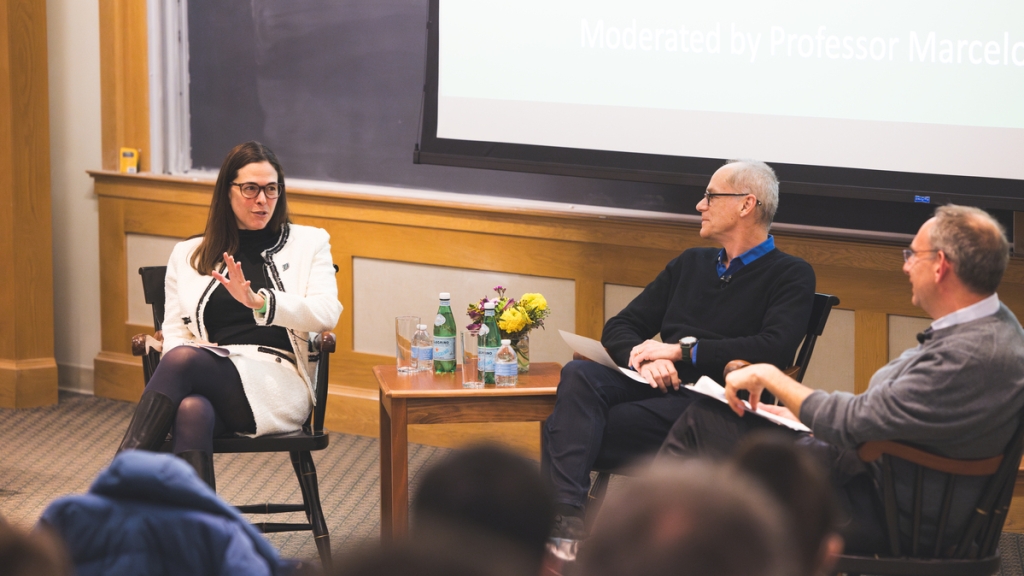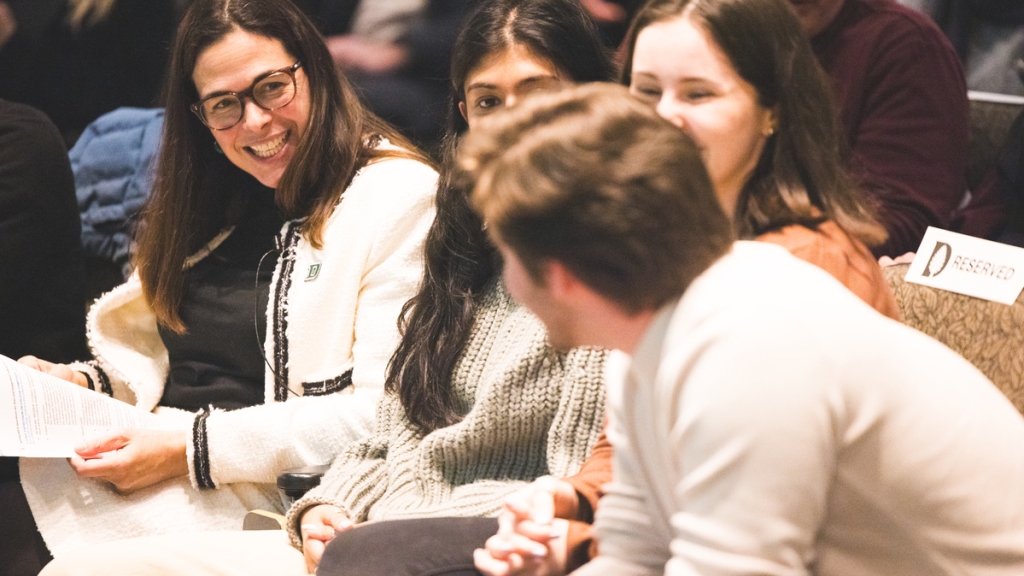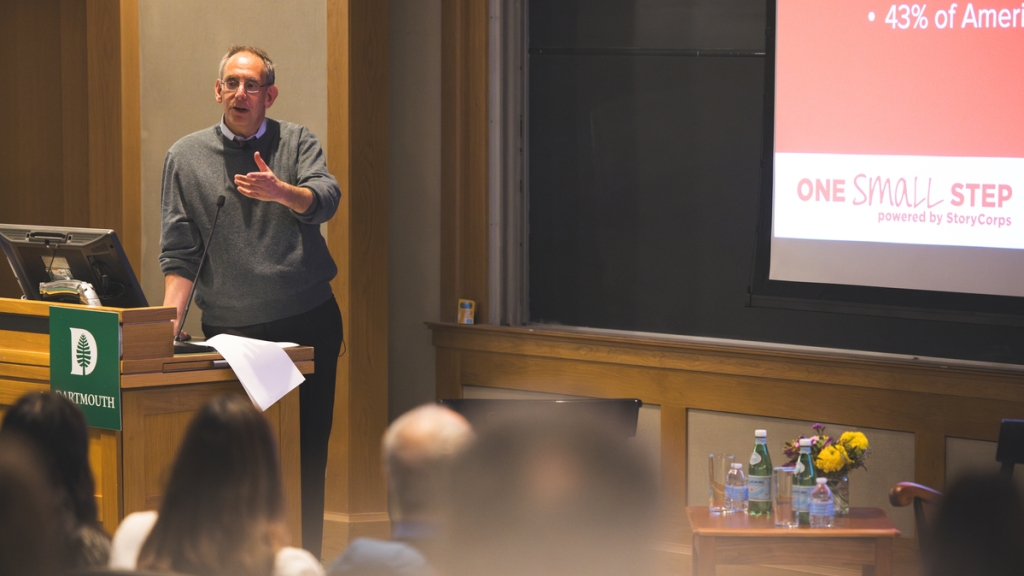StoryCorps Partnership Starts Building Bridges
One Small Step recordings on campus will help foster dialogue.
More than 100 students, faculty, staff, and other community members braved Wednesday's sleety storm for the kickoff of an ambitious Dartmouth initiative that aims to model for the country how to build bridges across bitter partisan divisions, one small step at a time.
The conversation and Q&A (watch video from the event itself) in Filene Auditorium with President Sian Leah Beilock and StoryCorps founder and president Dave Isay launched Dartmouth's three-year collaboration with StoryCorps' One Small Step program, which pairs people with different political views to record a facilitated conversation about their lives, and thereby see each other in new ways.
The hour-long event reflected the excitement—and sense of urgency—driving the collaboration.

President Sian Leah Beilock makes a point during a conversation and Q&A with StoryCorps founder Dave Isay, right, moderated by Marcelo Gleiser, the Appleton Professor of Natural Philosophy. (Photo By Katie Lenhart)
Dartmouth is "training the next generation of leaders across the broadest swath of society who will go out in education and business and politics and the nonprofit world and have an impact," President Beilock said during the discussion with Isay. "If we can learn with you about how to listen to each other, how to have humility, how to have the courage to approach uncomfortable situations, I can't think of anything more important."
"We think that the Dartmouth community has the potential to model for the rest of the country what it looks like when we're able to see the humanity of people with whom we disagree," Isay said.
The partnership, which Beilock announced in her Inaugural address last fall, launches as Dartmouth has drawn national recognition for its success in facilitating difficult discussions about the Middle East. It is part of the Dialogue Project, the central initiative of Dartmouth Dialogues that provides training in collaborative dialogue skills, fostering a community that cultivates the respectful and open exchange of ideas.
The conversations' powerful potential to forge connections was on display during Wednesday's kickoff, in excerpts from One Small Step recordings made by students on campus during winter term, and the reflections of student participants who spoke during the event.
In their recording, conversation partners Adithi Jayaraman '24 and Jhozef Sheldia '24 discussed how the COVID-19 pandemic affected their personal beliefs.
The pandemic exacerbated the anxiety she was already feeling, which shaped her beliefs about mental health, said Jayaraman, a philosophy major, who then asked Sheldia about his experience.
"My dad got really sick," said Sheldia, who is majoring in philosophy and Jewish studies. "He was in hospital for two weeks, and that's actually a big part of why I switched from science to religion at Dartmouth, maybe changing the trajectory of my life."

From left, President Sian Leah Beilock talks with StoryCorps participants Adithi Jayaraman '24, Keli Hubert '24, and Jhozef Sheldia '24 before the launch of the Dartmouth partnership on Wednesday. (Photo By Katie Lenhart)
Sheldia added that he was "a little embarrassed" by how some people on his side of the political spectrum reacted during the pandemic.
"Unfortunately, I think it became a political issue," he said, and asked Jayaraman whether people who share her political beliefs ever react in ways she wished they didn't.
A lot of people aligned with her political beliefs were doing a similar thing, seeing an issue as black or white, while in reality, "we all live in the gray," she said. "Understanding where you come from and how much thought you've put into what you believe has given me more respect for people with different beliefs than I have."
Pulling back from the brink
Offering sobering statistics from recent polls, Isay highlighted what stands to be lost and gained in the U.S., "a great country" where people "have so much potential."
Just one in 10 voters regards people whose politics differ from theirs as reasonable, said Isay, a bestselling author, 2000 MacArthur Fellow, and 2015 recipient of the $1 million TED prize, which was awarded to exceptional individuals with a bold idea to spark positive change. "And at the end of 2021, 15 percent of Americans said that we may have to resort to violence to save our country; 24 months later, 23 percent of Americans said that."
Yet, he sees the collaboration, which will employ One Small Step's "tested, shovel-ready, scalable methodology," as a beacon of hope.
"If we can get these conversations out there and people can hear who students actually are … you guys can show the country how it can be done," Isay said, responding to a question from moderator Marcelo Gleiser, the Appleton Professor of Natural Philosophy, about the best possible outcome. "My dream is that Dartmouth models for the country a new way of being, and that we can pull ourselves back from the brink."
In response to Gleiser's question about free expression on college campuses, Beilock reflected on one of the goals that guides her work as Dartmouth's president.
"How can we create environments where students, faculty, staff, and alums are not self-censoring, where people feel like they can push against each other, where they feel like they can get to know people even who really feel differently?" she said.

StoryCorps founder Dave Isay, speaking at the partnership launch with Dartmouth, told the audience, "You guys can show the country how it can be done." (Photo By Katie Lenhart)
At the end of the day, Dartmouth is about excellence, about generating knowledge and impact, she said. "The data is very clear that you do that when you get different people with different lived experiences feeling like they can all be at the table pushing at each other."
Taking the next step
The collaboration will work to equip the Dartmouth community with skills such as empathetic listening, managing emotions, and finding points of connection, said Elizabeth F. Smith, dean of the Faculty of Arts and Sciences, who founded and co-leads the Dialogue Project with Kristi Clemens, the director of student and staff initiatives.
"Developing these skills has perhaps never been more important, especially as we enter an election year," said Smith.
Dartmouth students, faculty, staff, alumni, and Upper Valley residents can sign up by April 22 to participate in the next One Small Step recording sessions, set for the week of May 20. This spring, the Dialogue Project will share updates about upcoming programming.